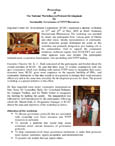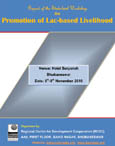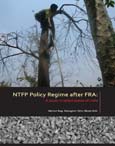 Proceedings of National Workshop on Protocol Development for Sustainable Governance of NTFP Resources
Proceedings of National Workshop on Protocol Development for Sustainable Governance of NTFP Resources
Publication Date : 07-Feb-2013
Regional Centre for Development Cooperation (RCDC) organized a national workshop on 25th and 26th of May, 2010 at Hotel Hindustan
International, Bhubanewar. The workshop was attended
by ninety one participants from various parts of Odisha
and other states. Mostly representatives of community
forest protection groups dominated the scene as this
workshop was primarily designed to give leading role to
the communities. And to support the community
initiatives, technical experts from ECOCERT and some
other agencies were also invited. The participants
included some cooperative functionaries who are dealing with NTFP trading.
|
 Report of the State Level Workshop on Lac Based Livelihood
Report of the State Level Workshop on Lac Based Livelihood
Publication Date : 07-Feb-2013
The two-day workshop was organized by RCDC in Hotel Suryansh, Bhubaneswar on 8th and 9th of November 2010. The objectives of the workshop were as under:
(a) To provide a platform to unite various stakeholders of lac, particularly the primary collectors/
cultivators, processors and traders for a common cause i.e. promotion of lac based livelihood in the state
that already has a rich tradition of lac based activities.
(b) To prepare a set of recommendations for submission to the government so that a pro-poor policy to this effect can be adopted.
The workshop was supported by Key Stone Foundation, Kotagiri. More than 80 participants from different parts of the state attended this programme majority of whom were cultivators and artisans.
|
 Investing in future
Investing in future
Publication Date : 27-Feb-2010
WATER is no longer an infinite resource contrary to the age-old
popular belief. Warning bells already have started ringing. Despite
efforts by the governments and huge investments, population not
having access to adequate quantity of water is increasing in leaps and bounds with every passing year.
|
 NTFP Policy Regime after FRA
NTFP Policy Regime after FRA
Publication Date : 31-Dec-2010
RCDC intends to bring a policy change through this publication at appropriate level, with corresponding reflections at
the ground level. Whereas the present study analysed the situation in eight states of India, the basic observations
are more or less same throughout the country; hence the basic recommendations & conclusions are applicable for the
country. However, some of the statistical data might have changed in the meantime, and also few policy changes
might also have occurred at the state level. Readers are therefore advised to update themselves with the latest
developments.
|